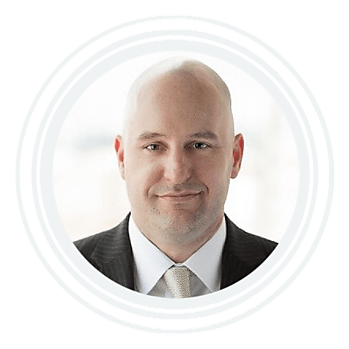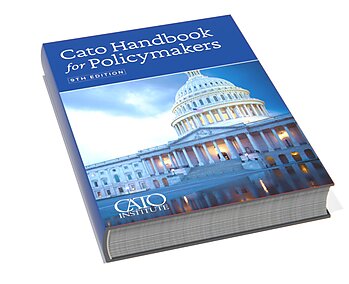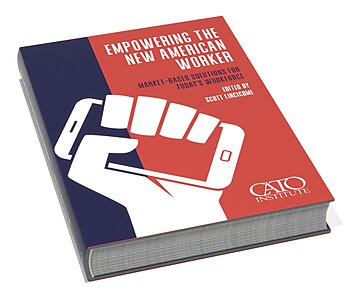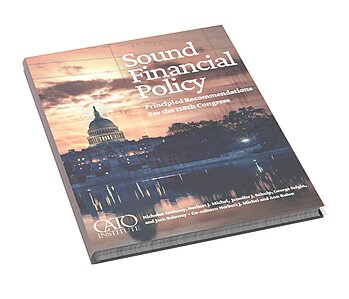By staying true to our principles, the Cato Institute sets itself apart as a reasonable, trustworthy, and nonpartisan voice in the most pressing policy debates.
Strengthening the Foundations of Freedom
“The worst thing that can happen to a good cause is, not to be skillfully attacked, but to be ineptly defended.”
–Frédéric Bastiat
In 2022, Cato experts worked with federal and state policymakers across the ideological spectrum to offer policy recommendations that increase liberty for all Americans.
New Talent: Raising Our Voice
Handbooks for Reform
The Cato Institute does more than just critique policies we don’t like—we also offer ideas for expanding liberty that policymakers can immediately put into action. With the arrival of a new Congress in 2023, we were poised to offer our policy recommendations to more lawmakers than ever before.
All three books have been distributed to every congressional office, and they will form the basis for extensive outreach led by Chad Davis, who plans to add more staff to his team to help increase adoption of libertarian policies in Congress and across the states.
Formula for a Crisis
The U.S. baby formula crisis was an intolerable, government-inflicted problem and a clear affirmation of everything we know to be true about markets and excessive regulations. Our experts helped ensure some relief for American families by educating policymakers and the public on how prolonged shortages were driven by protectionism and overregulation, and they paved the way for temporary tariff relief in the FORMULA Act.
Vice president of Cato’s Herbert A. Stiefel Center for Trade Policy Studies Scott Lincicome, along with policy analyst Gabriella Beaumont‐Smith, offered solutions that would bring families immediate relief while educating the public about the government policies that caused the crisis. Although the suspended tariffs returned in 2023, both Lincicome and Beaumont-Smith are continuing to make the case for permanent reforms—including the removal of tariffs, needless import regulations, and government monopolies of certain industries—to prevent future crises.

During the crisis, Scott Lincicome testified before the Senate Judiciary Committee on how government policies created the infant formula shortage.
Tariffs,
needless import regulations,
and exclusive contracting practices
led to market concentrations and product shortages while preventing quick market adjustment in response to economic shocks.

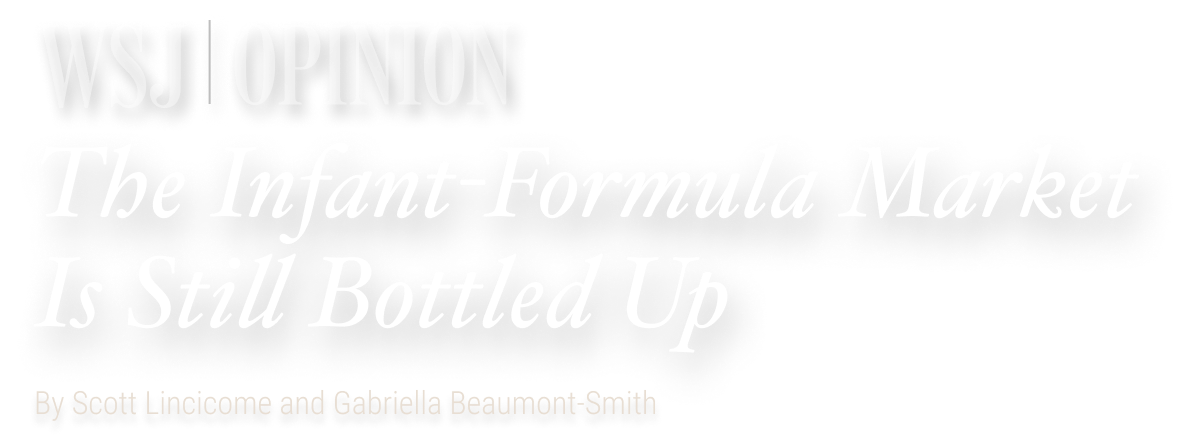
Free Movement of Peaceful People
Our current immigration system is confusingly complex, imposing senseless quotas that can leave many immigrants waiting in line for decades, or even a lifetime. Regardless of which party is in power, this complexity remains an issue that Cato seeks to improve with innovative ideas to reform the legal immigration system.
Vice president of economics and social policy studies Alex Nowrasteh continues to be a highly respected voice on immigration policy. In 2022 his research was cited by MSNBC, the Wall Street Journal, and Boston Public Radio, among others, and he was interviewed or featured on panels by C‑SPAN, the American Enterprise Institute, and the Brookings Institution.
In early 2021, associate director of immigration studies David J. Bier published a policy analysis on H‑2B visas and called on Congress and the Biden administration to reform the H‑2B program to make it easier to hire and retain guest workers. Shortly thereafter, the Department of Homeland Security (DHS) and the Department of Labor (DOL) increased the cap on H‑2B visas by 22,000 additional visas. In December 2022, the DHS and DOL again increased the previous cap, by an additional 64,716 visas for 2023.
Cato research on immigration and crime was cited multiple times in a DHS rule to preserve the Deferred Action for Childhood Arrivals policy, preventing the removal of noncitizens who grew up in the United States with legal status as the children of skilled workers on visas.
30 Years of Critiquing State Fiscal Policy
Every two years since 1992, the Cato Institute has released a new edition of its Fiscal Policy Report Card on America’s Governors, which uses statistical data to grade governors from A to F on their taxing and spending records. The report brings national attention to governors who are implementing sound fiscal policy and demonstrating that the Cato vision of limited government is both practical and popular when put into practice in their states, while also highlighting governors who caused economic damage through overtaxing and overspending.
The 2022 report, written by Chris Edwards and former economics research associate Ilana Blumsack, includes data since 2020 and discusses the wave of more than 20 states that have cut income tax rates in that time. Iowa governor Kim Reynolds attained the highest score for keeping a tight clamp on state spending and signing into law major income tax reforms.
|
GRADE
|
TOOK OFFICE:
LEGISLATURE:
|
Five governors received an A grade in our Fiscal Policy Report Card on America’s Governors: Chris Sununu of New Hampshire, Pete Ricketts of Nebraska, Brad Little of Idaho, Doug Ducey of Arizona, and Kim Reynolds of Iowa. Eight governors received the lowest grade of F: Tim Walz of Minnesota, Tom Wolf of Pennsylvania, J. B. Pritzker of Illinois, Gretchen Whitmer of Michigan, Phil Murphy of New Jersey, Kate Brown of Oregon, Gavin Newsom of California, and Jay Inslee of Washington.
The report’s evaluations have been proudly touted by governors that scored well, including Reynolds during the Iowa Press debate on PBS and former Arizona governor Doug Ducey on Fox Business Network’s program Kudlow. Dozens of journalists across the country have cited the 2022 report.
Testimonies
With the addition of new hires to our government outreach team and our continued invest- ment in raising our voice on the Hill, Cato’s experts will play an even larger role in offering liberty-based solutions to policymakers and their staffs on the most pressing issues facing our country.
Taking it to the States
In 2022, Cato’s government affairs team met with more than 300 state legislators on issues ranging from health care and insurance to occupational licensing and land-use regulations.
New Talent: Raising the States
Senior fellow Dr. Jeffrey Singer—a practicing surgeon in Arizona—is leading efforts to encourage a federalist approach to health policy, allowing states to test out innovative solutions to reduce harm from opioids and increase access to mental health treatments. Singer is frequently invited to testify in state senate hearings and regularly engages with state policymakers on ways to prioritize harm reduction for drug users and to reduce barriers to treatment for patients. His research helped pave the way for psychologists to prescribe medications to mental health patients in Colorado and opened the door for similar reforms in Utah, Hawaii, Arizona, and Pennsylvania. Singer advised former Arizona senator Nancy Bart and her staff while they worked on issues related to the opioid crisis. In June, then governor of Arizona Doug Ducey signed a bill introduced by Senator Barto, requiring law enforcement to obtain a search warrant before accessing the state’s prescription drug monitoring program database.
Congressional Fellowship Program
In line with Cato’s mission to provide an influential voice for liberty in the nation’s capital, the Institute convened two series of seminars in 2022 as part of Cato’s Congressional Fellowship Program. More than 50 congressional staffers from both parties participated. The program was open to all Capitol Hill policy staff and consisted of weekly networking receptions and discussions with Cato experts.
The summer programming focused on international relations and covered topics including trends in global freedom, U.S. foreign policy, and the benefits of free trade, with the goal of helping staffers understand an American foreign policy of peace, commerce, and honest friendship, as described in President Thomas Jefferson’s first inaugural address. In the fall, sessions covered the philosophical roots and practical applications of constitutional law from a libertarian perspective. Discussions focused on separation of powers, the role of the judiciary and recent developments at the Supreme Court, and the First Amendment and free speech, among other topics.

The value in the Congressional Fellowship Program is not only in the important policy and philosophy lessons imparted, but also in the “fellowship” between Republican and Democratic policymakers.
Through these gatherings, congressional staffers forge relationships, both with Cato and with each other.
In an increasingly polarized Washington, DC, few programs provide this sort of opportunity for cross‐partisan
and cross‐ideological connections.



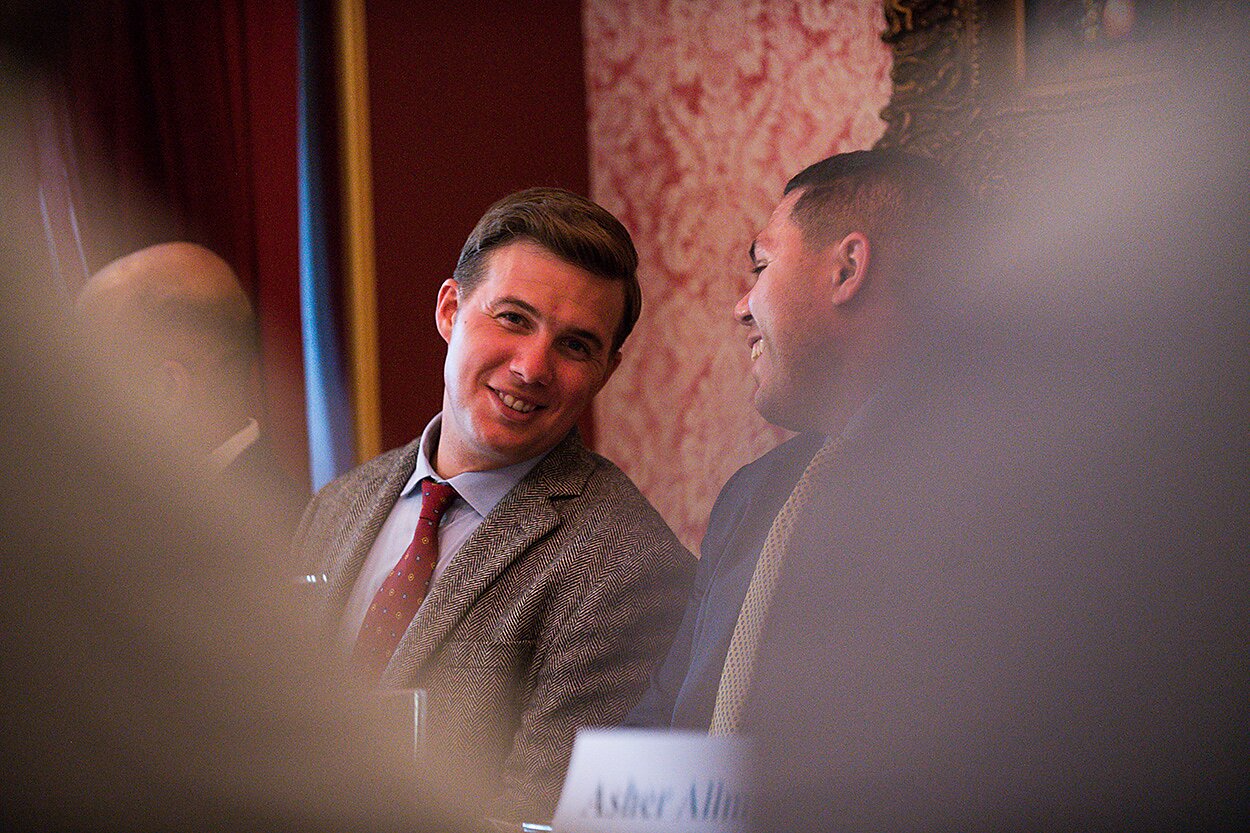


Previous Chapter
Next Chapter
Reading List
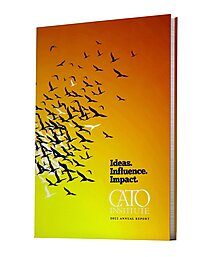
Download the Full Annual Report

